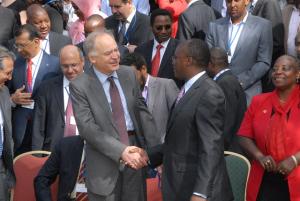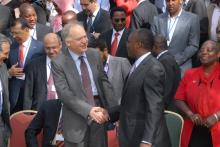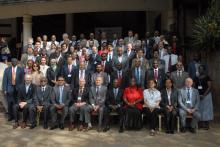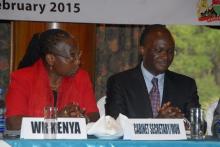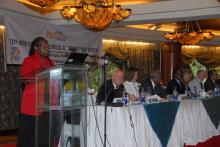Polio outbreak increasingly under control in the Horn of Africa
Nairobi Kenya, 9 February 2015 - The Horn of Africa Technical Advisory Group Meeting opened in Nairobi today with a clearer indication that the intensive response to the polio outbreak launched 21 months ago is beginning to bear fruit.
Somalia, where the last wild poliovirus (WPV) was detected, has gone polio free for six months. Somalia has made great gains with only five cases reported last year compared to 194 cases detected in 2013. Ethiopia had nine cases in 2013 had one case reported last year while Kenya reported none compared to 14 cases detected in 2013. The last case of WPV in Kenya was reported in July 2013.
The meeting brought together country teams from Somalia, Djibouti, Eritrea, Ethiopia, Uganda, South Sudan, Tanzania, Yemeni and Kenya. These countries are showing evidence that despite critical huddles like security and inaccessibility in some areas like Somalia, the outbreak is promisingly under control.
The meeting is however not without caution or oblivious of the task that remains ahead in order to keep wild poliovirus out of the region.
Commending the region for marking six months without a new wild poliovirus, WHO Kenya Representative Dr Custodia Mandlhate said the period called for a sustained momentum of activities in order to keep the virus permanently out of the region and complete the job.
Speaking on behalf of all other UN agencies in Kenya, Dr Mandlhate said:
“For us to keep wild poliovirus out of the region and our countries, we have to evaluate ourselves continuously and ask if we are on track with implementing the 2013 Polio Eradication and Endgame Strategic plan and various HOA-TAG and outbreak response assessment recommendations,” she said.
She said each country needed to evaluate its status in regard to implementation of high quality supplemental immunization activities (SIAs/polio campaigns), surveillance gaps, strengthening routine immunization, strategic advocacy, communication and social mobilization (ACSM). Special attention needed to be accorded to especially high risk areas, mobile, nomadic and border populations she added.
“The interruption of transmission of the virus has taken steady leadership and commitment by the MOH and partners, extensive work by technical staff, consultants, health workers and willingness of communities.” She applauded most families and parents for “the manner in which they had kept their doors wide open every time our teams visited their homes to vaccinate the children”.
“In the end, their willingness to participate in this process and protect their children has greatly contributed to keeping the virus out of Kenya.” She also commended the HOA-Technical Advisory Group (HOA-TAG) for its unwavering commitment and for the recommendations which had contributed to the current status. The meeting is organized for the HOA-TAG to review the recommendations it made at the 11th Horn of Africa TAG meeting in August 2014. The TAG will evaluate the status, progress and future action plans to ensure countries are on track in keeping the virus out of the region. This is towards implementing the 2013 Polio Eradication and Endgame Strategic plan set for 2018.
Addressing the meeting, Cabinet Secretary Mr James Macharia said the polio outbreak had underscored the reality that every country was affected by its neighbour and that they have to be their brothers’ keeper.
He thanked the TAG for the continued work which had helped the region to share success stories and lessons. “Indeed we can win the game if we support each other as countries,” he said.
He said for the countries to keep the virus out of the region, they needed to maintain high population immunity through coverage of routine immunization, SIAs (campaigns) and surveillance. He thanked partners who had enabled Kenya to control the virus and to go unaffected for 19 months. Kenya administered 65.7 million polio vaccination doses between May 2013 and December 2014.
_________________________________________
For more information, please contact:
Jemimah W Mwakisha, Communications & Social Mobilisation
Email: mwakishaj [at] who.int (mwakishaj[at]who[dot]int)
Tel: +254 722 509 403 / +254 710 149 489



